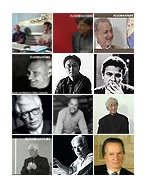"Architecture is..."
 Professor Robert M Craig, of the Georgia Tech College of Architecture is known to impress on his students an quirky habit he picked up. [Paraphrasing,] "When ever I go to one of those lectures, when a famous architect comes to town, I bring along my notebook to write just one thing down. Invariably, the lecturer will start a sentence or defend a reply with 'Architecture is...' and what he says after that is what I write down. I've got hundreds of those sentences now..."
Professor Robert M Craig, of the Georgia Tech College of Architecture is known to impress on his students an quirky habit he picked up. [Paraphrasing,] "When ever I go to one of those lectures, when a famous architect comes to town, I bring along my notebook to write just one thing down. Invariably, the lecturer will start a sentence or defend a reply with 'Architecture is...' and what he says after that is what I write down. I've got hundreds of those sentences now..."His notepad highlights an odd fact. As a profession, we don't even agree on a definition of architecture. It’s a blessing. It’s a curse. During those lectures though, at those times when someone is bold enough to make such a statement, we are afforded a chance to engage our work and the ages. The professionals analyze themselves. Without the myopia important during material choices or wall sections, we can address the current effort in a continuum.
Diving back into the Floornature.com Interview Archives affords readers several such moments. Perhaps it’s comforting to hear how designers go about seeking solutions [common for most articles], but one in four dare to talk about something larger. Below are excerpts from a few...
[September 2002 - Ben Van Berkel]
Laura Puliti: What could architects add to architecture itself?
Ben Van Berkel: I recently believe that architecture should be seen not only as a place where you "stay", where you separate the internal world with the external world. I don't believe actually that architecture today is any more having this classical role of sheltering spaces.
I think what is so interesting about today, especially when we use our new techniques, and we use imagination with them, I think that architecture today can also, for instance, mediate more. Maybe we can give more messages to the city with architecture, so that architecture can really communicate much more than ever.
And I think always architecture was doing that, maybe in the history before, but I do believe that we reduced architecture also a little bit too much with the modern age, where we said, well , architecture needs to be pragmatic, it needs to be functional, it needs to be "serving" the city.
I think that's all important, but I think that architecture should also create a complex set of iconographic qualities so that it becomes an emblem where you can read more things in, so that it works like art.
So that's what I describe lately in our latest publication, UNStudio: Unfold, where we describe that architecture should fall somewhere between art and airports. Because airports are very much functional, serving you, bringing you from A to B, but they don't have anything of the art, it's not having any sort of cultural effect, and I think these combinations I'd like to improve of (with) that what could be added to architecture.
[September 2001 - Jean Nouvel]
Marco Casamonti: Once you said that architecture must communicate the restlessness of the world. Taking into account the recent political events, what will it change in the expression of architecture?
Jean Nouvel: I do not think that this problem has a connection with architecture.
[May 2005 - Michael Sorkin]
Massimiliano Giberti: I have some questions, not only about your lecture but about the current situation or scenario of architecture and urban design. Do you think there is any relationship between the work of the urban designer and the work of the architect in terms of sharing ideas, instruments and research methods? ...
Michael Sorkin: I'm teach urban design in the United States and, having said that, I have to tell you that I think urban design is essentially a fake discipline. In order to understand what urban design is historically, we have to introduce the idea of planning, which is the predecessor discipline.
Essentially, what happened with planning was that over the years it became more and more socio-scientific, economic, quantitative, as it were.
And in order to recuperate the phisical aspects of planning for architecture this discipline of urban design was invented. So, for me, I think trying to draw a distinction between architecture and urban design is extremely unproductive.

1 Comments:
It's sad that you link to a materials magazine for good interviews. Architecture Record and the like should be embarrassed.
Post a Comment
<< Home